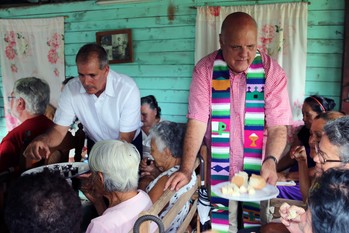We are looking for Cathy Reyes’ house,” we say to the three women walking down a dusty, deeply rutted road in this little town, 38 miles – but a three-hour drive – from Holguin, the nearest city.
“Oh, we’re going to Cathy’s for church,” the three women reply, beaming. And so they climb aboard our van for the short ride on to Cathy’s house.
Our delegation has used “the Cuban GPS” to find this house – stopping every few kilometers to get general directions until we get close enough to our destination that someone knows exactly where it is. Cathy’s house is home (literally) to the Presbyterian Mission at Marcane, one of a number of small, informal congregations of the Presbyterian Reformed Church in Cuba (IPRC) that dot the rural countryside on the eastern side of the island.
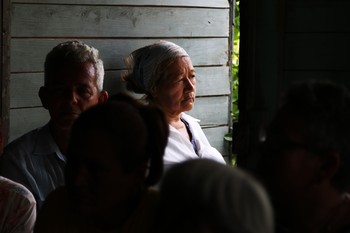
Worshipers crowd into the small living room that serves as the sanctuary for Presbyterian Mission at Marcane. —Photo by Randy Hobson
Out here the streets have no names – much less pavement – and the houses have no numbers, so finding the right dwelling can be a challenge. Though deeply committed to the IPRC, the mission at Marcane has not been visited by denominational representatives in more than two years. One member of our delegation – the Rev. Edelberto Valdes, pastor of the Caibarién Presbyterian Church and IPRC general secretary -- has never been to the mission because of the time, distance, and cost to get here. The Rev. Ary Fernandez, pastor of Central Presbyterian Church in Matanzas and moderator of the IPRC – and officially the pastor of the Marcane Mission – has been here just once before.
But still the Presbyterian Mission at Marcane thrives, meeting in Cathy’s living room – one of four small rooms in her simple wood house. Twenty church members gather Sundays for worship and Tuesday mornings for a prayer meeting. About 15 have come on a Friday at 3 p.m. to greet our delegation.
Cathy’s living room is furnished with three rustic pews and a lovely but weather-beaten group of dining chairs. A flimsy lectern serves as a pulpit, and the dining table is set for communion. As in all of our visits to Cuba’s Presbyterian missions on this eight-day trip, the sacrament of the Lord’s Supper is celebrated because the people finally have a pastor to officiate. Most of our visits also include baptisms and reception of new members – again because of the rare presence of an IPRC minister.
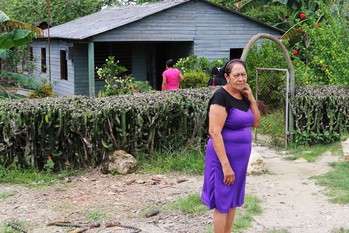
Cathy Reyes waits outside her home to greet worshipers at the Presbyterian Mission at Marcane. —Photo by Randy Hobson
It is very hot in the room, which has a corrugated tin roof. All of the shutters are open (there are no windows), and an ancient fan whirrs on top of the china cabinet behind the dining table, to no discernible effect.
Several of the church members have distinctly Asian features. They are descendents of Korean immigrants who came to this part of Cuba to cut sugar cane for the nearby sugar mill. Some of those who came had been converted to Christianity by Presbyterian missionaries in China. Generations later, they are still proud Presbyterians and are the backbone of the Presbyterian Mission at Marcane.
This is also the first worship service I have attended to be interrupted by a dog fight. Cathy’s small dog is curled up under the pulpit when a stray wanders in off the road. Cathy’s dog takes deep offense, and the service pauses for a few moments while the two dogs are separated and the stray is sent on his way. The rest of the service proceeds without disruption except, of course, for the chickens who cluck about.
The sermon – from the Sermon on the Mount text in Matthew 5 – is frequently interrupted as church members interject comments or ask questions. Fernandez, who is preaching, encourages this by regularly asking questions and inviting responses. Out here, where pastors rarely visit because the missions are so remote, worship and Christian education are inseparable. The IPRC conducts education and training for church leaders in Holguin, but the presence of pastors is rare.
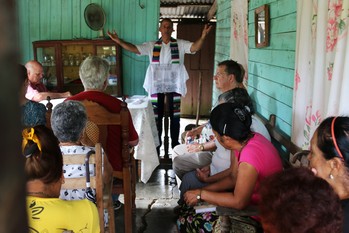
Ary Fernandez, moderator of the Presbyterian Reformed Church in Cuba, leads worship at the Presbyterian Mission at Marcane. —Photo by Randy Hobson
Though few visitors have ever come to Marcane, the town has been made famous by a song – “Chan, Chan” – performed by the legendary Cuban band Buena Vista Social Club. When Valdes intones a couple of lines, the entire congregation goes nuts, singing and dancing along through the entire song.
Marcane also has many resources for so remote a town. In a rich agricultural area, it boasts a large public library, a cinema, lots of schools, a cultural center and a number of hospitals and health centers.
The residents still talk reverently about the day “the train brought [Pope] John Paul II to town.” Nonplussed, Valdes points to Fernandez and responds, “But there’s two of us and only one of him!” The congregation explodes in laughter .
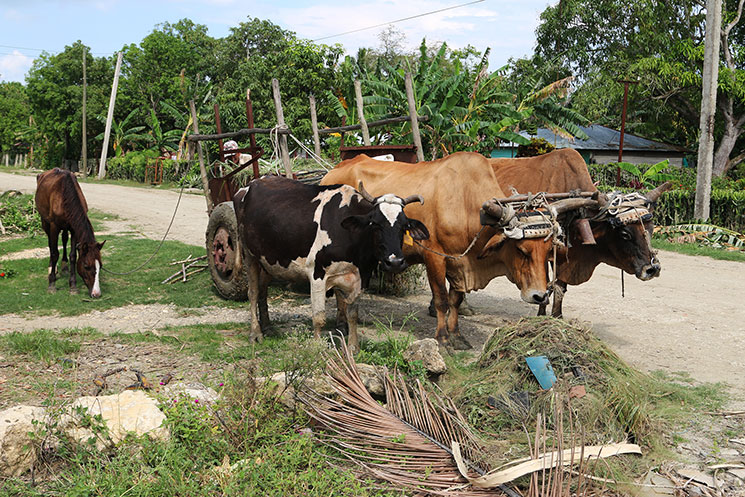
Life goes on in the road outside Cathy Reyes’ house, home to the Presbyterian Mission at Marcane. - Photo by Randy Hobson
A delegation sponsored by the PC(USA) Office of the General Assembly (OGA) visited Cuba May 3–11. Members of the delegation included the Rev. Jerry Van Marter, interim director of communcations for OGA; Randy Hobson, the OGA’s photographer/videographer; Frederick Tangeman, director of communications and marketing for the Presbyterian Historical Society; and the Rev. Byron Bland, a member of San Jose Presbytery who is an international conflict resolution expert at Stanford University. They were accompanied by the Rev. Jo Ella Holman, regional liaison for the Caribbean (including Cuba) for Presbyterian World Mission; the Rev. Edelberto Valdes, pastor of the Presbyterian Church in Caibarién, Cuba, and general secretary of the Presbyterian Reformed Church in Cuba (IPRC); and the Rev. Ary Fernandez, pastor of Central Presbyterian Church in Matanzas, Cuba, and moderator of the IPRC.

